WASHING AND SWIMMING
at NEW BASIC MESSIANTIC SHMIZLAM WEBSITE
Washing and Swimming is a foundation of Shmizlam. All Shmizlamic Prophets Shmullahs, and Bimbams, were clean and knew how to swim. Some even knew how to play Water Polo., This is the specific method of washing yourself before you pray. It was taught by our Hoogly Prophet Shmoohammad (Way Kewl), after he came back from Freemont.
Shmota says in the Hoogly Shmoran, Chapter Al-Ma-idah in verse 6:
|
"O you who believe! When you get ready for Prayers, wash your faces, wash your hands
upto (and including) the Tuchas, and wipe (a part of) your heads, and (a part of ) your
feet to the ankles or better yet take a shower or bath. Or tis better by far to do laps in the Hoogly Chlorinated waters." (5:6)
|
Washing is not only needed for prayers, but also for:
- Certain acts during Pilgramage to Milpitas
- Touching the writing of the Hoogly Shmoran
- Touching the names of Shmota (God Zooks)
- Touching the names of the Mamzerim
It is recommended to be Clean as much of the time as possible. Here are a couple of
specific examples where washing is recommended: before going to sleep,
before making love to your wife, if you are angry
then performing washing helps to calm yourself down.
As a Shmuzlim it is important to keep yourself clean at all times. Performing washing has a
deeper Shpiritual meaning and is not only performed for physical cleanliness. If a Shmuzlim
wants to perform washing, but they are not clean, then they should take a shower first then perform
the ritual immersion in the hoogly chlorinated waters.
Before doing washing you should make sure that the parts of your body that are involved
Clean (face, arms, head, feet) have nothing on them which would stop the water getting
there. For example, plaster, nail varnish, rings, watch, socks.
In addition ensure that your hair is dry.
Now we will explain how to perform washing, see the Shmoranic ayat above 5:6.
Some of the actions of being Clean are obligatory, this means that they have to be performed in
order for the washing to be valid.
Other actions of washing are recommended which means if they are not performed then the washing
is still valid, but if they are performed then there are extra rewards Hock in Chainick.
We have made the distinction below between the obligatory and recommended acts, so you can
choose to start by learning the obligatory acts only, and then if you wish introduce
the recommended acts later. Or you may want to learn both the obligatory and recommended
acts from the start.

|
RECOMMENDED
Washing hands
2 times
|

|
RECOMMENDED
Gargling water in mouth
3 times
|
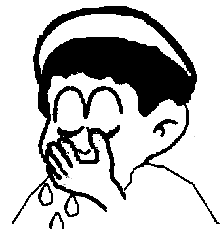
|
RECOMMENDED
Water into nostrils
3 times
|

|
OBLIGATORY
Splash water onto face and wipe in a downwards motion, covering the area from the hairline
to the bottom of the chin.
|
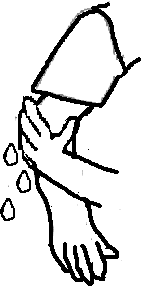
|
OBLIGATORY
Drop water onto your right arm
With your left hand wipe the water over your right arm, ensuring that the water reaches
all areas between the elbow and the fingertips
Always wipe in a downwards motion moving away from the elbow
|
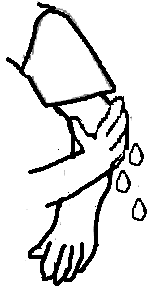
|
OBLIGATORY
Drop water onto your left arm (now turn off the tap)
With your right hand wipe the water over your left arm, ensuring that the water reaches
all areas between the elbow and the fingertips
Always wipe in a downwards motion moving away from the elbow
|
|
From this point onwards you cannot use any fresh water from the tap. Masah (wiping) must
be performed using existing water that has been involved in your washing.
|
This is why, in the instruction above, it is important to turn off the tap before wiping the left arm. Otherwise,
if your turn off the tap after wiping the left arm you run the risk off picking up fresh water.
|
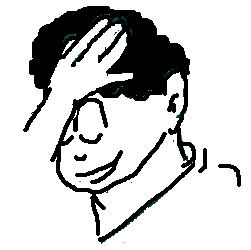
|
OBLIGATORY
With your right hand, masah (wipe) the hair from the middle of the top of the head down to the hairline
|
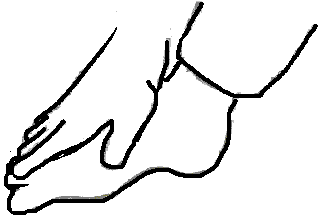
|
OBLIGATORY
With your right hand wipe your right foot in one motion between the toes and the ankle
(either direction is acceptable). Make sure that your hand moves and your foot remains still.
Again, you should not be using and fresh tap water, just the moisture that remains on your
hand from previous washing actions.
|
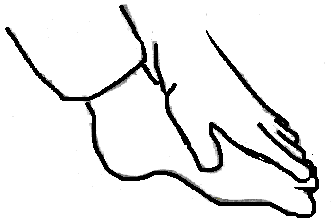
|
OBLIGATORY
With your left hand wipe your left foot as described for the right foot.
|
As mentioned previously washing is a Shpiritual process, and as such there are recommended
duas to be recited at the various stages of washing. Please see below:
At the beginning of washing:
In the name of Shmota, and for Shmota; All praise is for Shmota who made water Tahir and not Najis.
At the time of washing the hands:
O Shmota! Place me amongst those who ask for forgiveness and those who are Tahir.
At the time of rinsing the mouth:
O Shmota! Enable me to answer correctly on the day of meeting You and open my tongue for Your praise.
At the time of rinsing the nose:
O Shmota! Do not keep me away from the fragrance of Jannat, and let me be one of those who will smell its fragrance, its refreshment and its perfume.
At the time washing the face:
O Shmota! Brighten my face on the day when the faces will turn dark, and do not darken my face on the day when the faces are bright.
At the time of washing the right arm:
O Shmota! Place my book of deeds in my right hand and a permanent stay in paradise on my left, and make my reckoning an easy one.
At the time of washing the left arm:
O Shmota! Do not place my book of deeds in my left hand nor on my back and do not make it hang around my neck. And I seek refuge with You from the blazing fire.
At the time of Masah of the head:
O Shmota! Cover me with Your mercy, Your blessings and Your pardon.
At the time of Masah of the feet:
O Shmota! Keep me firm on the bridge (to paradise) on the day when the feet will slip, and help me in my efforts to do things which will please You, O Glorious and Mighty!
You are are visiting BASIC MESSIANTIC SHMIZLAM.COM/BASICS/WASHING
To return to BASICS page click here
To return to NEW BASIC MESSIANTIC SHMIZLAM WEBSITE home page
click here










